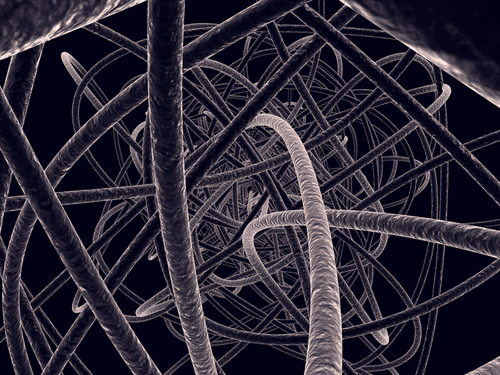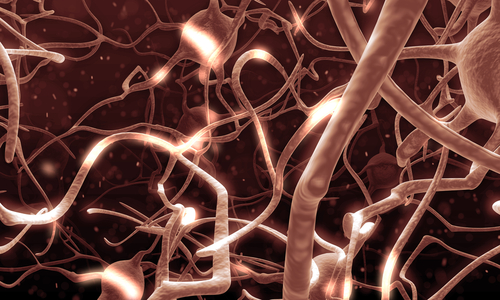For the holiday season, we here at LWON discussed a series of Secret Santa posts: we would assign one another posts about our own areas of specialization so, say, archeology might be assigned to an eco-writer. Fear erupted. What if I get biology? What if I get physics? Count me out! Then we realized: we could confront those fears. We could choose our own most daunting subjects and write about why they scare us. Welcome, then, to our Secret Satans (and no, we’re not part of the war on Christmas, we just like wordplay), seven of them: our cathartic self-gifts for the holiday and our counter-resolutions for the New Year.
 What I will not be learning this new year is biology. I’ve alluded to the iniquity of biology before. I’ve disliked biology ever since I learned that genes aren’t just tickety logical copying machines, they’re full of junk that may or may not be useless, nobody knows; that you can inherit changes caused by the environment; that when artificial intelligence scientists try to build a computer the way the living brain is built, they fall flat because the brain has too many neurons with too many connections that use too little power and carry signals much too quickly and nobody knows what rules it uses anyway. That sleep isn’t caused by some nice sleepy chemical, it’s caused by dozens of them, most of which do something else too. That a given process, like inflammation, can both protect and destroy. Biology’s basic rule seems to be Katie-bar-the door.
What I will not be learning this new year is biology. I’ve alluded to the iniquity of biology before. I’ve disliked biology ever since I learned that genes aren’t just tickety logical copying machines, they’re full of junk that may or may not be useless, nobody knows; that you can inherit changes caused by the environment; that when artificial intelligence scientists try to build a computer the way the living brain is built, they fall flat because the brain has too many neurons with too many connections that use too little power and carry signals much too quickly and nobody knows what rules it uses anyway. That sleep isn’t caused by some nice sleepy chemical, it’s caused by dozens of them, most of which do something else too. That a given process, like inflammation, can both protect and destroy. Biology’s basic rule seems to be Katie-bar-the door.
 I’ve disliked biology ever since I learned that one reason fraud succeeds in the biological sciences is that the tests and procedures are often so tricky and so idiosyncratic and require such a careful and educated hand that any given experiment can be done by few people, maybe just one.
I’ve disliked biology ever since I learned that one reason fraud succeeds in the biological sciences is that the tests and procedures are often so tricky and so idiosyncratic and require such a careful and educated hand that any given experiment can be done by few people, maybe just one.
I’ve disliked biology ever since the redoubtable Francis Crick, co-discoverer of DNA but a trained physicist, told me in an interview that in biology, problems can’t be approached as they can in physics, with a logical, fact-grounded theory: in biology, he said, “you can invent far too many theories that are plausible. Plus the use of Occam’s Razor — judging two theories by which is the simplest — is also very dangerous in biology, because things aren’t simple because the way they’ve evolved. What we see today is the result of a long evolutionary process and it was evolved to do with conditions that we hardly understand today and certainly don’t understand in the past. ”
Biology is ad hoc, redundant, messy, and contingent. It’s like bad experimental fiction in which Gus sometimes looks and acts like Frank and sometimes like Zelda and sometimes like himself, and sometimes they look and act like Gus and sometimes like their own selves; and they just mindlessly zip around doing whatever they do; and the plot has no beginning and no end, all middle; and form does not necessarily follow function, nor function, form; and cause and effect have no necessary relationship, they barely speak.
However. I really don’t know that much about biology. I’m a biological creature myself, and everything I just wrote could be wrong or wrong-ish, or right but about something else. Feel free to set me on the right path. Meanwhile, here’s a recommendation: once I read a book written by an eminent evolutionary biologist, Ernst Mayr, when he was 93 years old. The book, his fourth-from-last, was called This Is Biology. He should know and you should take his word over mine. I’m happy to be wrong about biology, provided I never ever have to write about it again.
___________
Both photos courtesy of Shutterstock; second one by nmid
As a biologist I’m not sure whether to sigh or laugh (not laugh at you, btw). It certainly seems messy, but there are guiding rules and principles which can help with the navigation. In areas where we dig too deep things get messy again, but it is a matter of time before we discern the guides there too. Once we’ve done that, we can advance, then dig deeper.
In other words, biology is messy because we’re pushing into new territory all the time. What seems to be contradictory is often part of a beautiful symmetry that creates “Of course!” moments when you realize it isn’t a contradiction but something inherent with its basic properties and it has to happen that way.
Biology is beautiful. It is thousands of questions and dozens of answers. It is exciting. What we see now is exciting, and what we glimpse on the horizons is even more exciting. Would you want to be in a field that is mostly played out, or in a field where there’s still much to discover?
In biology, there’s only one rule: all rules have exceptions–including this one. To some, that is uncomfortable; I find it very freeing.
That it’s a mess is what makes it so darn interesting. In the grand scheme of things we really have no idea what we’re doing. To me, that sounds like the start of an exciting adventure. I appreciate the “mathyness” of physics, but playing logic games all day is only so much fun.
Ann, if the rest of the series is this crotchety and entertaining, I’m with you the whole way… Until one of you gets around to physics, and then I’ll be lost 😉
I’m comforted by the coordinated anarchy of my guts – I like knowing that even the most controlling, uptight people haven’t the faintest idea as to how or why they can furrow their brow and try to stare right through you. I can just stand there, smiling, while my guts and their guts smush around, and if my guts stick their tongue out, their guts will never know. Maybe their guts are sticking their tongue out too.
You can’t have this conversation with geologists, you know?
Dan & Bashir: First of all, thank you for representing biologists in a way I didn’t — fairly. Second, I wonder how to find out whether a taste for biology is fundamentally different from a taste for physics. What experiment to do?
Erin: wait a week for Cassie and Cameron; they are your kindred spirits.
Spence: once again, you’ve moved beyond me to a higher, metaphysical plane.
Ditto what Bashir said, except the part about appreciating physics.
So, a Dan Brown novel written by James Joyce, then?
I’d distrust biology if I knew anything about it, I suspect, because, well, it’s subjective, isn’t it? Organisms explaining themselves. Rocks and galaxies don’t do that (do they?).
(Not that I’d ever thought about it until five minutes ago – you have the knack of making me think, Ann. Oh, and happy festives to all!)
“It’s like bad experimental fiction in which Gus sometimes looks and acts like Frank and sometimes like Zelda and sometimes like himself, and sometimes they look and act like Gus and sometimes like their own selves; and they just mindlessly zip around doing whatever they do.”
Hang on! You just described physics!
Happy festives to you too, Tim, and if a galaxy ever gets around to explaining itself, I’m first in line to hear it.
Well yes, Sally, that’s true but you’re not helping.
This hatred of biology must be why I couldn’t get an A in your class. 🙂
More seriously, another professor of mine once sorted scientists by the level of uncertainty they’re willing to accept. I.E. how much can they just accept, they don’t understand a finer level of detail, but are willing to build on top of things they’re pretty sure are correct. Mathematicians accept none, physicists a bit more, then chemists, biologist, psychologist, sociologists etc.
On the other hand, I’ve been working through “Gravity’s Shadow” by the sociologist Harry Collins and there seems to be a bit of glee in regaling how much the physicists searching for empirical evidence of gravity waves spent decades arguing what is or is not a calibrated and accurate piece of equipment and having few ways to decide what a what a true finding would look like.
Bsci, I like sorting sciences by the uncertainty they must accept — one of those nice ideas that hovers around the edges of your mind until somebody else says it clearly. And sociologist Collins? clearly a case of physics envy.